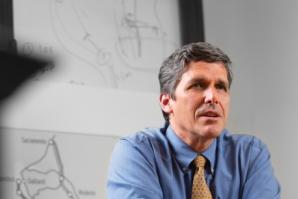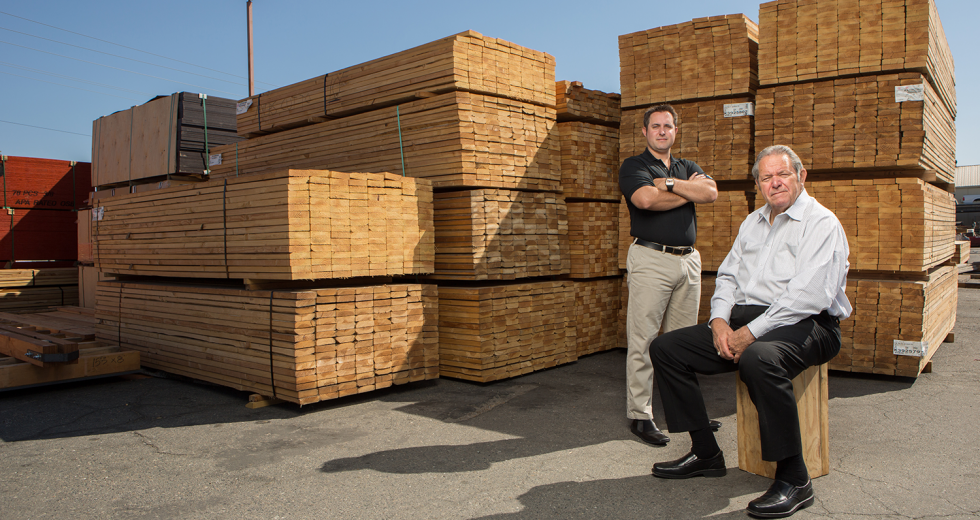Things always seem to take too long. When the cable guy says he’ll arrive by noon, we know it’ll be closer to supper. Doctors are late. The mechanic needs an extra day. Every government project, it seems, takes longer than expected; the left can point to Iraq, the right can point to healthcare.gov. So it was something of a shock when Caltrans announced that its Fix 50 project, a restoration of the W/X Viaduct on Highway 50, actually finished early.
The credit goes to construction guru C.C. Myers, who, for more than two decades, has been California’s go-to guy when roads are ravaged by acts of God (like the ’94 Northridge earthquake) or the toll of time (Folsom’s Lake Natoma Crossing, Interstate 5 in Sacramento, Route 99 in Turlock, the Walnut Creek Interchange, and the list goes on). The New York Times once called him the “Miracle Worker Highway Man.”
His current company, Myers & Sons (which he runs with son Clinton), juggles more than 25 active projects across six states. They finish jobs early again and again.
So what makes this possible? What’s their secret sauce? When I asked C.C. and Clinton about their “company values,” there was a bit of an awkward pause, as if I had asked something completely nonsensical, like, “Have you considered conducting your meetings in French?” This isn’t the kind of firm that’s big on corporate buzzwords like synergies and paradigm shifts. “The corporate partners are going to kill me for saying this, but we aren’t driven much by slogans or logos,” says Clinton, the company’s vice president. “We don’t have values written all over our walls.”
Related story: Catching up with C.C. Myers
They might not have official corporate values, and they probably wouldn’t even use these terms. But there are, it seems, three principles that explain Myers & Sons’ rapid success: an obsession with speed, a merit-based focus on people, and the jet-fuel that powers it all — C.C. Myers’ larger-than-life personal brand.
Brand C.C.
“The corporate partners are going to kill me for saying this, but we aren’t driven much by slogans or logos. We don’t have values written all over our walls.”
The words “personal brand” have a connotation that’s almost new-age. It’s the kind of thing you hear advocated by social media gurus who give seminars — or worse, “Tweet-ups” — on how to “amplify your message” and “cut through the clutter.” In other words, it sounds like the exact opposite of C.C. Myers, who, at the age of 76 and standing six feet five inches tall, looks like he could uproot a tree with his bare hands.
But look closer. Sometimes a company is built in the image of its CEO, and that personal brand informs its products, performance and stock price. Think Steve Jobs, Bill Gates and Richard Branson. “If the CEO is already well known, they will be able to leverage their brand to get people excited about working for the company,” says Dan Schawbel, who teaches courses on personal brands and is the author of Promote Yourself. “The CEO is a reflection of the company culture, which tends to attract certain talent and repel others. Richard Branson had his own reality show, writes for Entrepreneur magazine and has written several best-sellers. Branson is more than a CEO; he’s an icon, and people want to work for and buy from companies that share his values and excitement.”
It will be a cold day in hell before C.C. Myers hosts a reality show, but the same dynamic is in play. “His personality is the DNA of the company,” says Clinton Myers. “It’s his can-do attitude. It’s his can-do spirit. He’s here at the office every day. He’s not an absentee owner. People look at him and say, ‘Hey, this guy is 76 years old, and he’s on our job site reviewing an estimate for a job.’”
And just as Steve Jobs has the humble roots of building a computer in his garage, C.C., too, has a storybook origin. He was raised on a farm. His dad put him to work at the age of 8, and every morning he woke before dawn to pick vegetables before school. And then, as soon as the bell rang, he hopped in the back of his dad’s truck and returned to the fields. “We never did homework, never did anything like that,” he says. “Instead, we milked the cows.”
That taught him everything he needed to know. In the 10th grade, he got a job and said, “To hell with school.” He dropped out at the age of 16, left home and hitchhiked to Long Beach. It wasn’t long before he got his first construction gig and, within a week, “fell in love with that job.”
The “Highway Man Miracle Worker’s” greatest miracle is akin to a return from the dead. In 2009, he sunk more than $20 million of his personal cash into real-estate investments (from Nevada to Colorado to Utah) just before the bubble burst, and then, well, as he tells me, “I lost money, but a lot of other people got hurt a hell of a lot worse.” The bankruptcy forced C.C. Myers (the man) to leave C.C. Myers (the company). He stayed retired for all of about 17 minutes and then formed his new firm, Myers & Sons Construction. They started with just one employee, Kurtis Frailey, and now they have roughly 160. Revenue is projected to crack $100 million this year, making it larger than C.C.’s original construction company (which, confusingly, is still called C.C. Myers.)
“C.C. Myers thinks that everything is possible,” says Rick Liptak, president of Dokken Engineering, a company that has partnered with C.C. on the design of more than 50 projects. “The opposite is true of a lot of other companies; people have the doom and gloom thing. C.C. Myers doesn’t have that. He sees a clear path to the goal line, and he goes for it.”
The Need for Speed
“I’m always trying to think about how we can get it done faster,” C.C. says in his relaxed, folksy drawl. “I try and get people to go get it done as fast as possible.”
Take the Santa Monica expressway. In 1994, after the Northridge earthquake collapsed four bridges along the freeway, C.C. was hired to replace two. Speed was essential. According to then-governor Pete Wilson’s office, each day the bridges were down would cost the economy another million bucks. As one project was set to kick off, C.C. looked at the subcontractor providing the iron-workers, did a double-take and realized the guy only had four men on the job.
“Where are all your people at?” C.C. barked.
That was all the guy had. For many companies, his limitations would be accepted as a realistic constraint. Shit happens. Not for C.C. He grabbed a phone and called every subcontractor in Los Angeles that did reinforced steel liners. “I knew ‘em all, and I said, ‘I need your help. I need your workers.’” At first they were reluctant. C.C. told them, “You’re not helping him, you’re helping me.” That did the trick. He recruited “every ironworker subcontractor” in L.A. and rounded up a team of 50. Once again, the power of the personal brand.
“We never did homework, never did anything like that. Instead, we milked the cows.”
Always faster. Always a new angle. On the same project, when a worker asked for donations for his kid’s Little League team, C.C. opened a wad of cash and said that if the crew could get the job done a little faster, he would give the baseball team $1,000. They got it done. The next day, he said he would buy everyone lunch if they could somehow get the job done a little faster still. They got it done. In the middle of all this, Gov. Pete Wilson popped up on the construction site and, as C.C. recalls, the governor said, “How do you think you’ll have this done by the 10th of April?”
“Pete, I’ll have it done.”
“You know it’s an election year. This would really hurt me if you don’t finish on time.”
“Take it to the f***ing bank, it will be done,” C.C. said.
And so it was. They had 144 days to complete the job. They got it done in 66. This was more than just a feather in his cap, it was a boatload of money. The state awarded a $200,000 bonus for every day C.C. finished early, meaning he snared a cool $15 million.
The math, then, becomes surprisingly simple: Since he gets $200,000 a day for finishing early, he is willing to spend up to $199,999 on extra workers, overtime and Little League donations. Again and again he employed this model to aggressively beat the schedule. (When Fix 50 finished six days early, Myers & Sons notched a $3.9 million bonus.)
Speed helps win bids, too. Since they now have the confidence that they will finish faster than expected, they can pitch a bid that’s lower than the competition — sometimes far, far lower — and make it up on the back-end. In 2007, for example, when a stretch of Interstate 80 collapsed in Oakland, a competing firm came in with a bid of $6.4 million. C.C.’s bid? $800,000. As usual, he zipped through the project and finished in a breezy 17 days — compared to the 50 days estimated by the state — earning a $5 million bonus.
“If you can gain two hours a day, every day, that might make a 3-day difference,” says Frailey, now the company’s operations manager. “You just push through, and you gain the two hours.”
The People
But speed comes with a tradeoff. The offices of Myers & Sons aren’t exactly filled with folks who prioritize work/life balance, and 9 to 5 it ain’t. Employees trickle into headquarters a little before 6 a.m., and the last ones file out after 6 p.m. They aren’t apologetic about this. “We ask people to work,” says Clinton, who quickly adds that they do encourage a casual atmosphere and that on Fridays you’ll find people in flip-flops.
Team C.C. believes in meritocracy. Do your job, and you’ll be rewarded. Don’t do your job, and you’ll be out on your ass. “We hire a lot of people out of the unions,” says C.C. “If they produce, we keep ‘em. If they don’t, we lay ‘em off.”
In the thick of the construction battles, they stagger shifts so teams are literally working around the clock. You know all those cliché jokes about passing a road-work construction crew and seeing one guy on a jackhammer and 10 guys eating sandwiches? Not here. “He’s got such loyal employees,” says Liptak from Dokken Engineering. “He’s got good judgment.”
Good people bring good partners. One of Myers & Sons first moves was to climb into bed with a benevolent partner, Sterling Construction, a
Houston-based contractor with a market capitalization of roughly $165 million (as of September). On an obvious level, Sterling brings some deep pockets, which gave them the financial muscle to chase bigger jobs. On a less obvious level, Sterling confers the benefits of sister companies, like the Arizona-based J. Banicki Construction (fully-owned by Sterling), which can partner up on joint-ventures. This made a project at Los Angeles International Airport go from a pipe-dream to reality. At the time of the proposal, Myers & Sons had never done an airport job, but Banicki filled in that gap. “We turned in a proposal that showed their experience with airports. And we had all the experience with the bridges and the retrofits,” Clinton says. “Together, we made a strong team.”
So what are the takeaways for a small business owner, middle manager or senior executive? C.C. is living proof that results can matter more than paradigms. You don’t need buzzwords to build. You don’t need inspirational posters to inspire. You need to work, and once you are known for that work, your personal brand, in turn, will bring even more work. It’s a virtuous cycle.
And it’s one that doesn’t look to end anytime soon. “I don’t have hobbies,” C.C. tells me. In theory he goes to Tahoe on Friday afternoons to relax, but then admits, “I’m ready to get the hell out of there by 1 or 2 p.m. on Sunday. I’m sort of a boring person. I gotta have people around me.”
Translation? He’s not slowing down. Faster, faster, faster. As he says, “I’ll work till I’m dead.”
Sick of the wait? Become a print subscriber and you’ll get all of your Comstock’s content at once, faster than C.C. Myers can say, well, ‘Faster!’
Recommended For You

Going Up
How one worker keeps operations at Tower Bridge golden
Bridge worker Scott Bennett has been tending to the iconic Sacramento structure for 12 years.

The Conductor
The California High-Speed Rail Authority replaced an engineer with a political operative to lead the nation’s biggest public works project. Jeff Morales instantly charmed his opponents but made technical decisions that placed high-speed rail at the mercy of the courts. Can Morales save his runaway train?

Mind Games
Tech darling Mark Otero hit it big, then almost hit restart
Bright orange walls and ergonomic chairs. A black conference table flanked by a half-dozen scruffy-chic men (zip-front sweaters, double-pierced ears, turn-of-the-millennium tattoos) and three times as many digital devices (nobody brought just one).

Levee Over Troubled Waters
Paying for repairs just got harder
It’s a calm, clear day on West Sacramento’s South River Road, a meandering two-lane route that runs atop a levee buffering houses and farmland from the placid Sacramento River. It’s hard to envision the chaos that would ensue if the great dirt barrier were to burst, pouring millions of gallons of water into adjacent homes and businesses, but that nightmare scenario just got harder to prevent.




Comments
Way to go. Payment by results is a scary prospect for most fat cats but it gets the job done. There is no greater incentive to be an insanely great salesman than getting paid commission. When I ran an advertising agency, we wouldn't charge clients a fee - we took a slice of the increased sales our campaigns generated. It's a meritocracy that weeds out the dead wood, the lazy workers, the bad managers and the wasted overheads. It also increases the number of people out of work - until they learn what work means.